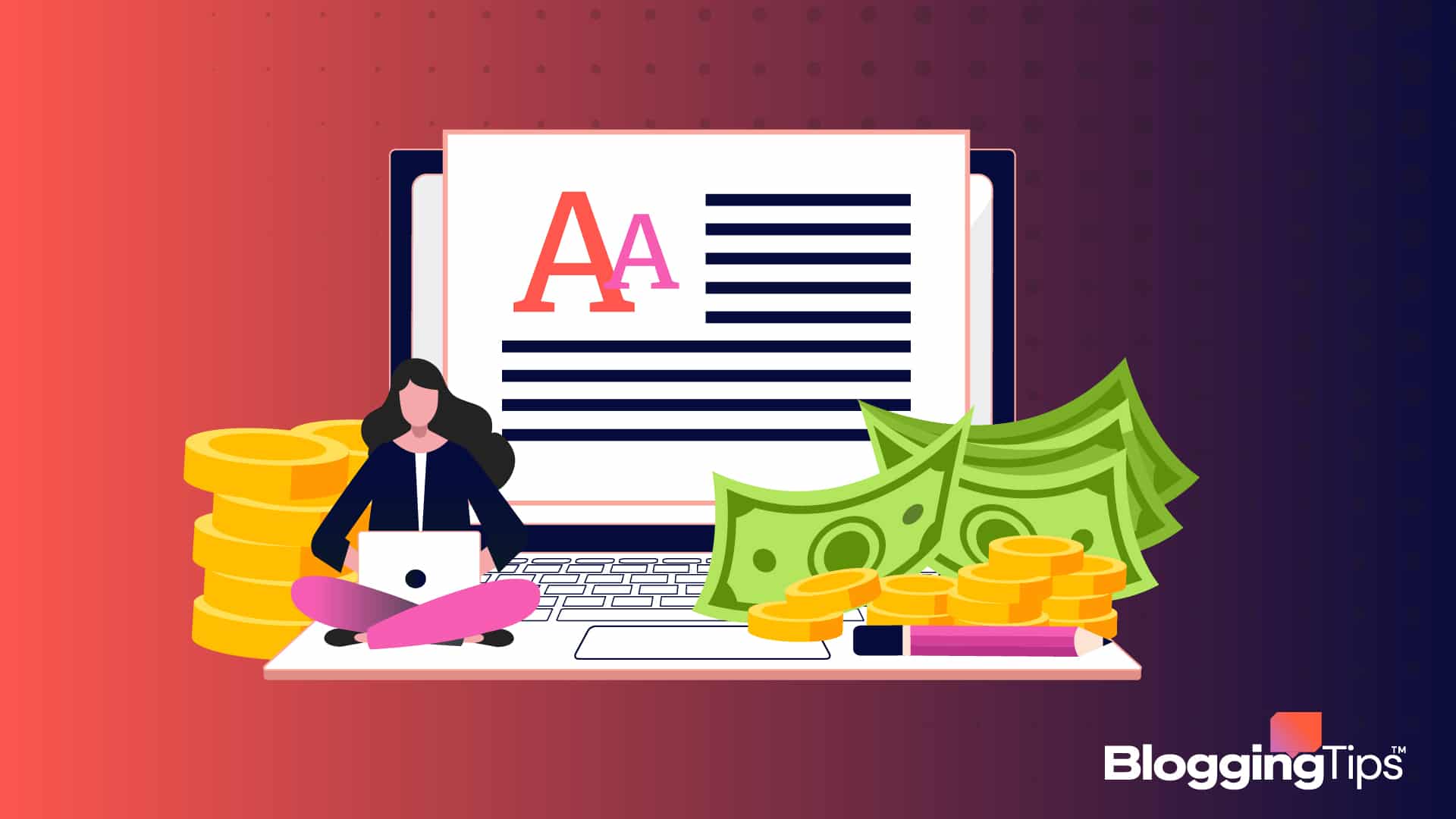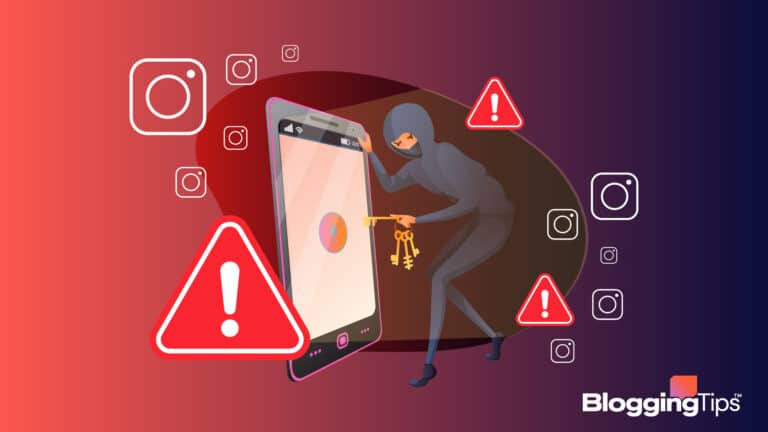So you want to start a blog to make a living?
With many successful bloggers posting about their wealth and freedom of life, it’s a no-brainer.
While earning an income by blogging takes a little while, it’s never too late to join the party. You can start a blog and make an income fast with some strategic planning.
Your initial earnings may not be enough for vacationing in the Maldives, but they should be adequate for a comfortable living.
Let’s learn how to make a living blogging with a few strategic tips on growing your blog and monetizing it.
Is It Possible To Make a Living Blogging?
Blogging is in no way a get-rich-quick scheme, but you can make a comfortable living with patience, diligence, and an effective strategy to grow your brand. Having an entrepreneurial mindset is also required to build a successful blog.
Blogging alone doesn’t guarantee an income, but it can open up many avenues for you to monetize your skill. For example, you can publish paid reviews, join affiliate marketing programs, sell ad placements on your blogging website, etc.
However you choose to monetize your blog, you must build traffic for your site.
According to Millennial Money, beginning bloggers can make between $500 – $1000 per month within the first year, possibly making $100,000 a year after two years. It depends on a few factors:
- How profitable is your niche
- How many monthly visitors you get
- Which companies you partner up with
- Which networks you collaborate with, etc.
Some bloggers make no money, while others earn as much as millions. According to Glassdoor, people earn between $42,000 – $57,000 on average by blogging as a profession.
However, this stat can be skewed as many top bloggers don’t reveal their income, while others take it as a side hustle.
How Hard Is It To Have a Successful Blog?
Starting a blog and ensuring consistent growth takes a lot of hard work. Only then comes the time to monetize your endeavor and earn an adequate income.
Most big blogs you come across are the results of years of work. Their founders have more likely spent much time developing their blogs into consistent money-making streams.
Check out the following YouTube video that debunks some popular blogging myths:
The process of making a living blogging includes:
- Starting a blog: You can either blog on a monetized platform or create your own website. Most profitable monetization opportunities need a self-hosted blog, which has its own management responsibilities and costs.
- Ensuring Content Quality: You must post consistently and strategically within a niche to find your target audience. Maintaining the quality of content is also paramount for your blog to become an authority.
- Optimizing Blog Content: Search engines like Google can make or break your blog with their ranking for your content. So you must actively learn and implement the content optimization best practices to ensure consistent growth.
- Monetizing Your Blog: Numerous monetization opportunities are available for blogs with different monthly traffic and page views. You must find the most profitable ways to monetize your blog to turn an income.
The beginning can be frustrating, with your blog receiving few visitors. However, once it gets up to speed, the rewards are worth all the hassles and wait.
Simply put, blogging is the right profession for you if you are confident about your entrepreneurial mindset and feel passionate about writing.
Over time, it may go beyond earning a living and making millions in profits.
How Do Beginner Bloggers Make Money?
Since Bill Gates opined content to be the king of the internet, blogging has grown into a massive industry.
Although digital content creation has many avenues, different blog publishers earn the lion’s share of this industry’s income.
You don’t necessarily have to wait until your blog becomes an authority in your niche. Earning money off your blog can begin once you hit around 1,000 monthly visitors.
Some of the fastest ways for beginner bloggers to make a living include:
- Advertisement Placement: Advertisers are more than willing to pay for a spot on your blogging website to capture readers’ attention. While the pay depends on view counts and ad clicks, you can earn a modest monthly income by associating with ad networks like Google AdSense or similar banner ad networks.
- Affiliate Marketing: Does your audience like products and service recommendations? You can monetize these recommendations by signing up with an affiliate program and receiving a cut for each sale on your affiliate link. For instance, the Amazon associate program only needs three purchases directed from your site in the first 180 days, making it a lucrative option for beginners.
- Selling Products: With a compelling product placement and promotion strategy, you can design and sell different products directly to your blog readers. It can be a physical or a digital product. While having more readers means a greater chance of sales, you can take inspiration from Brittany Berger to launch a product soon after starting your blog.
You can also offer coaching and consultancy or charge a subscription fee from your readers to make an income from your blog.
This, however, requires building some authority or having substantial prior experience in your niche. You will also need to market your expertise through the proper channels.
How To Make a Living Blogging: 5 Essential Tips for Beginners
Every money-making blog needs quality content easily accessible to readers and sponsors.
Nonetheless, most importantly, your blog content must offer value for the readers so they visit your website regularly and pay heed to your recommendations.
Successful money blogging requires a strategic mindset, focusing on your principal goal – earning a living blogging.
For beginners, attaining this goal requires following a few steps to get the blog up to speed and monetize it.
1. Come Up With a Great Blog Idea
While blogging is different from podcasting, both require an exciting idea for success. You can talk about anything in your blog or podcast, but making people listen to or read your words requires evoking their interest.
Therefore, conduct thorough online research and find some profitable niches for money blogging while ensuring the topics are valuable for your potential readers.
Numerous profitable blogging niches are available, including finance, fashion, food recipes, pet care, digital marketing, etc.
After finding a few broad niches, you can narrow them down for your blog idea by answering the following questions:
- How skilled and passionate are you about a particular blogging niche? This is fundamental to consistently publishing high-quality content for your readers and generating new ideas to keep them returning regularly.
- How competitive is the niche in the blogging space? If you already find many successful blogs in a particular niche, breaking into and driving organic traffic to your site might be too challenging.
- How much money can you make in a particular niche? Different blogs rake in uneven sums of money from the same strategy, as not all topics have high-paying affiliate programs or heavy-spending audiences.
Once you find some broad subjects you feel passionate about, narrow them down to one choice based on its money-making potential.
Finding a specific category within a niche can also benefit in building authority on the topic and avoiding competition.
For instance, you can start a blog about growing vegetables in the backyard instead of gardening.
2. Provide a Great User Experience
After finding a niche, focus on setting up your website. Numerous blogging platforms, like Medium or Substack, pay freelance writers based on their readership.
However, creating a consistent stream of a living wage is much easier with a self-hosted blog. You can create a website for this using a CMS like WordPress.
A few things you will need to sort out for launching your blog include:
- Registering a website domain.
- Subscribing to a web hosting service.
- Designing your blog for easy navigation and speed.
You should buy a domain name or website address related to your niche and register it with a domain provider.
It should be something easily memorable and related to your subject. For instance, I use bloggntips.com to share my knowledge and tips about blogging.
Next, focus on building and designing your website. You can use the WordPress CMS to create a website without coding. A drag-and-drop WordPress theme might be the best for beginners, as it requires no coding skills.
As a beginner, keep your website clean and easily accessible so your readers have an enjoyable experience.
You should also have a contact and about page with authentic details about you and your blog to build rapport with your audience.
Once ready with a basic layout, you can launch your blog and make further improvements later.
3. Build and Grow Your Audience
After launching your website, you must start publishing quality content.
Of course, it helps if you can write blog posts quickly, but creating a successful blog without offering quality is close to being impossible.
You must also work creatively and strategically to make your blog visible to your target audience. There are some techniques for doing so, but you must have some patience and focus on the following:
- Get Your Site Indexed by Google: As Google is the biggest search engine, ranking high on its search result pages (SERPs) is paramount for your blog’s success. So, submit a sitemap of your blog to Google Search Console as soon as launching it to get your site indexed immediately.
- Optimize Content for SEO: You must also optimize your blog content with a keyword-driven title, meta description, tags, and keywords. The URLs should also be optimized for a better ranking. You can use free tools like Google Trends and Keyword Planner to find keywords in a topic and niche.
- Have a Content Plan: Consistent posting is vital for keeping your audience interested in your blog and building authority. Expert bloggers recommend publishing up to four posts weekly, but you must at least post one. You ensure consistency by creating a content plan and posting as per schedule.
- Setup Subscription and Analytics: A successful blogger collects readers’ email addresses through signup and free giveaways, which can be later used for email marketing. You should also set up website analytics to learn in-depth about your audience to plan your content better.
The first few blogs you post on your website may not receive any page views.
This is normal for any blog, as it takes some time for your readers to find your website and recognize the value it can offer. So have some patience and keep on to your plan.
4. Fast-Track Growth With Promotion
Growing organically with search engine optimization and word of mouth is a low-cost marketing tactic that takes time for growing a blog organically.
However, you can shorten this time with some dynamic promotional tactics.
Some of the cost-effective ways of promoting a blog include:
- Promoting your blog on social media.
- Asking friends and acquaintances to share your blog posts.
- Collaborating with influential bloggers in your niche.
- Running surveys and creating stats posts to receive organic backlinks.
Among these, sharing your blog on social media is the most straightforward, as these platforms receive massive daily visitors. Moreover, it doesn’t cost a penny but can drive enormous traffic to your site.
You can share your website link on your social media profiles and pages. Creating a standalone page for your blog is also beneficial for building lasting relationships with your audience.
However, you must put effort into interacting with the blog’s social media followers to achieve the desired result.
Looking to multiply your blog’s growth? You can try running paid adverts on search engines and social media, whichever is more fruitful for reaching your readers.
However, paid adverts cost money per impression and click, which can rake up quickly if you aren’t careful.
Irrespective of the promotional tactic, you must maintain a consistent aesthetic and tone of voice across all platforms. It will help you to build a unique brand and authority in your niche.
5. Monetize Your Blogging Website
Once you build a loyal and consistent readership base, you can start the blog monetization process. Again, there are numerous possibilities to create an income stream, depending on your blog niche.
With about 1,000 monthly page views, you can earn an income by placing display and banner ads using an ad network like Google Ads.
You can also actively seek out advertising partners, selling your blog’s ad space directly to potential sponsors in your niche.
Another way of monetizing a blog as a beginner is finding rewarding affiliate programs in your niche.
As mentioned above, these niche programs pay different sums for a particular result, with specific requirements for engagement and clicks.
Some bloggers also publish paid reviews on their sites, which is slightly contentious.
You may need to fulfill a few legal requirements for issuing a paid guest post, including disclosing clear information regarding your partnerships on your website.
Another lucrative way for beginning bloggers to earn an income is by designing high-margin products for profit.
It can be digital or physical goods related to your blog topics or something complimentary. This monetizing strategy requires grueling promotion for success while having a massive social media following is also helpful.
As your blog traffic increases, more monetization opportunities will open up.
For example, you can partner with brands to promote their products and services on your blog for a lucrative fee. It usually requires around 10k total pageviews.
First, however, you should create a media kit detailing what you can offer for brands to land their sponsorship deals.
You can also make money through email marketing if you have gathered your reader’s information.
This is an excellent way to inform your audience about a product launch or encourage them to check out your latest blog (and increase page views). You can also share sponsored content using your email list.
Check out the following YouTube video where successful blogger Ryan Robinson offers advice on starting and monetizing a blog:
Frequently Asked Questions
Who Is the Highest Paid Blogger?
Ariana Huffington is by far the highest-paid blogger, with her media empire turning in around $540.7M per year. She co-founded “The Huffington Post,” which was rebranded as HuffPost in 2017.
Ariana rose to prominence after 2005 before breaking out on the global stage in 2011.
How Fast Can You Make Money From a Blog?
It takes about a year or so to make an income from your blog. However, no set period exists for any niche, with 27% of bloggers making money within six months.
Nevertheless, making a living blogging takes around 2 years, which is the case for 45% of professional bloggers.
How Many Views Do You Need To Make Money on a Blog?
With Google AdSense, you can make money with as little as 1,000 page views per month. Some other money blogging methods like affiliate marketing or product selling need around 1-3 sales to generate an income.
More lucrative monetizing options like a brand partnership or consultancy require around 10k+ monthly pageviews.
Wrapping Up
Launching a blog might be straightforward for the availability of various convenient tools, but turning in a livable income requires consistent hard work.
However, no effort will translate into a living wage without the right strategy.
You can start and make a living blogging in 2023 by following the broadly discussed steps in my guide. I also offer detailed guidance for each step in my other posts.
Please let me know how you are doing with your blog in the comments. You can also request further clarifications.







